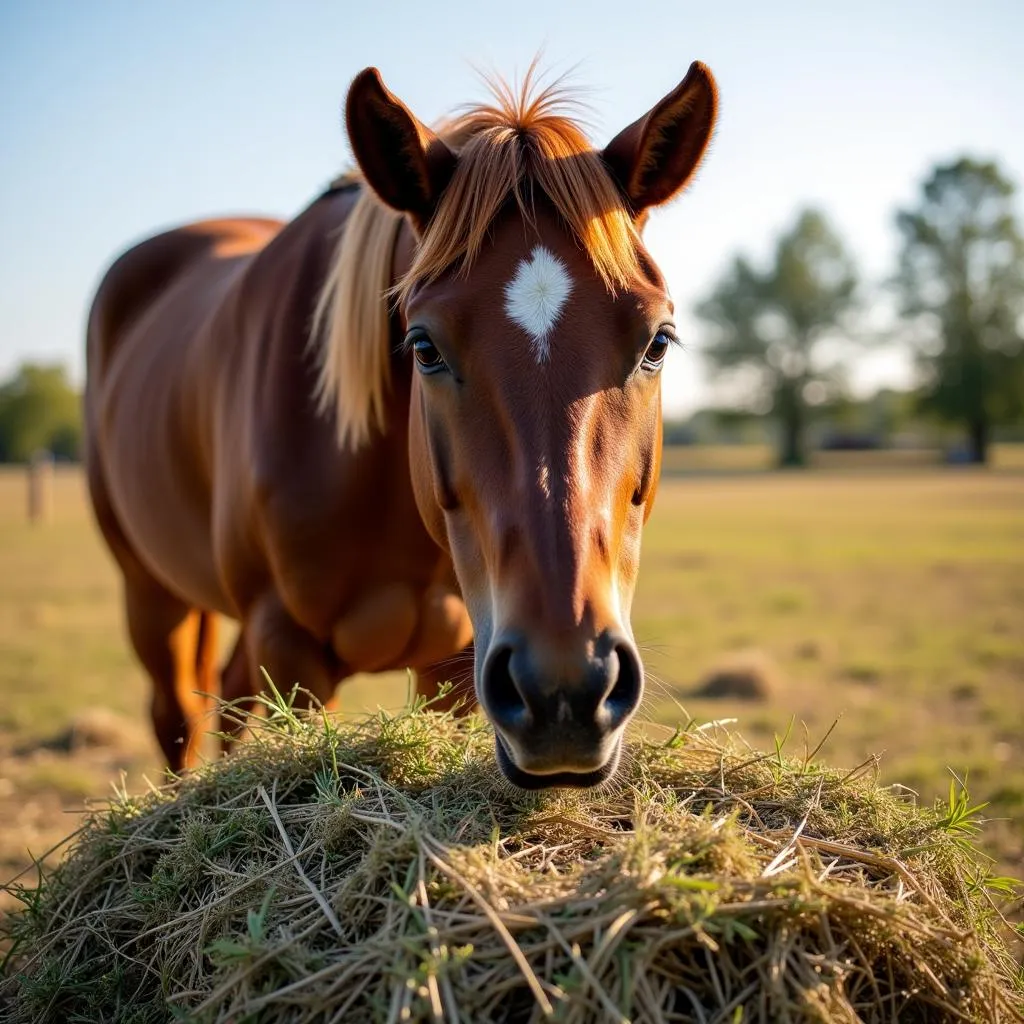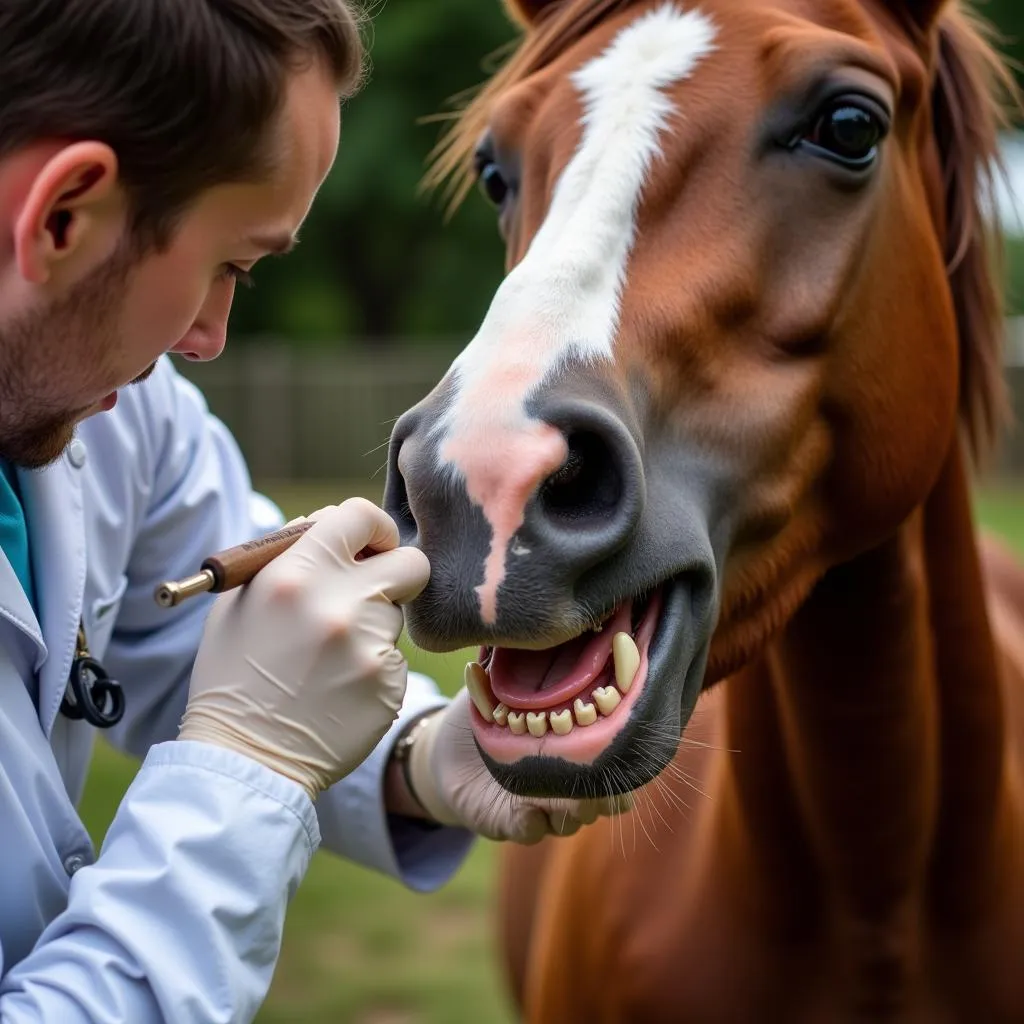The term “Bacon Horse” might sound intriguing, perhaps conjuring images of steeds with a penchant for breakfast meats. However, the truth is far less fantastical and more grounded in the realities of equine care. Let’s delve into the myth, the misunderstanding, and the essential facts surrounding horses and their dietary needs.
The Myth of the Bacon-Loving Horse
 Horse Enjoying Hay in a Field
Horse Enjoying Hay in a Field
The notion of a “bacon horse” likely stems from a misunderstanding of what constitutes a healthy horse diet. Horses are herbivores, meaning their digestive systems are specifically designed to process plant matter. Their natural diet consists primarily of grasses and hay, providing them with the necessary nutrients for energy, growth, and overall well-being.
Feeding bacon or any processed meat product to a horse can have detrimental effects on their health. These foods are high in fat and salt, both of which can disrupt a horse’s delicate digestive balance. Moreover, such foods lack the essential fiber that horses need for proper digestion and can lead to serious health issues, including colic, laminitis, and even death.
Understanding Equine Dietary Needs
Horses thrive on a diet rich in fiber, primarily obtained from grazing on pasture grasses and consuming hay. Hay should form the foundation of a horse’s diet, providing essential nutrients and promoting digestive health.
Essential Components of a Balanced Equine Diet:
- Hay/Pasture: High-quality hay (Timothy, Orchard Grass, Alfalfa) or fresh pasture should comprise the majority of a horse’s daily intake.
- Grain: Oats, corn, and barley can supplement the diet, providing additional calories and energy for working or growing horses.
- Salt and Minerals: Horses require access to a salt lick or mineral block to replenish essential electrolytes and minerals.
- Water: Fresh, clean water must be available at all times to maintain proper hydration.
Common Misconceptions about Feeding Horses
 Veterinarian Checking a Horse's Teeth
Veterinarian Checking a Horse's Teeth
Many myths and misconceptions persist regarding what horses can and cannot eat. Here are a few common examples:
Myth: Horses can eat anything a goat can eat.
Fact: While goats and horses are both herbivores, their digestive systems differ. Goats are more tolerant of a wider variety of plants, while horses are more sensitive to certain compounds found in some plants.
Myth: Carrots and apples are essential for horses.
Fact: While carrots and apples can be given as treats in moderation, they should not replace the core components of a horse’s diet. Overfeeding treats, even healthy ones, can lead to an imbalance in the diet and potential health issues.
Myth: All horses need grain.
Fact: Only horses with increased energy requirements, such as those used for work, performance, or breeding, may require grain supplementation. Overfeeding grain to horses with lower energy needs can lead to obesity and other health problems.
The Importance of Expert Guidance
Just as you wouldn’t consult a chef about your car’s engine, you shouldn’t rely on anecdotal information or online forums for expert advice on feeding your horse. Always consult with a qualified equine veterinarian or equine nutritionist to develop a feeding program tailored to your horse’s individual needs.
“Every horse is unique,” says Dr. Emily Carter, DVM, an equine veterinarian with over 20 years of experience. “Factors such as breed, age, activity level, and overall health condition influence their dietary needs. A personalized feeding plan ensures optimal health and well-being.”
Bacon Horse: Separating Fact from Fiction
The term “bacon horse” highlights the importance of dispelling myths and seeking accurate information regarding equine care. Remember, horses are not designed to digest meat products like bacon. Their digestive systems thrive on a fiber-rich diet consisting primarily of hay, pasture, and potentially supplemented with grain and other essential nutrients.
By understanding and meeting your horse’s unique dietary needs, you can ensure they lead a long, healthy, and fulfilling life.
FAQs about Horse Diets
1. How much hay should I feed my horse?
A general rule of thumb is to provide 1.5-2% of their body weight in hay per day. However, this can vary depending on factors like age, activity level, and metabolism.
2. Can horses eat bread?
It’s best to avoid feeding bread to horses. Bread is high in carbohydrates and can lead to digestive upset, colic, and weight gain.
3. What are signs of a healthy horse’s coat?
A healthy horse’s coat should be shiny, smooth, and lie flat. A dull, rough, or patchy coat can indicate nutritional deficiencies or other health issues.
4. How often should I deworm my horse?
Consult with your veterinarian to establish a deworming schedule based on your horse’s individual needs and your region’s parasite prevalence.
5. Can I give my horse treats?
Treats can be given in moderation but should not exceed 10% of their daily caloric intake. Choose healthy treats like apples, carrots, or commercially prepared horse treats.
Need More Information?
For personalized advice on equine care and nutrition, contact our team at Justus Horses USA. We’re here to support you and your equine companions every step of the way.
Call: 0772127271
Email: [email protected]
Visit us at: QGM2+WX2, Vị Trung, Vị Thuỷ, Hậu Giang, Vietnam
Our dedicated team of equine experts is available 24/7 to answer your questions and provide expert guidance.